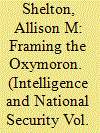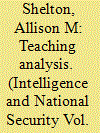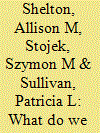| Srl | Item |
| 1 |
ID:
103570


|
|
|
|
|
| Publication |
2011.
|
| Summary/Abstract |
Despite some arguments to the contrary, I argue that because ethics benefit, rather than harm, the intelligence profession they should be considered an inherent part of intelligence studies. The literature largely presents intelligence ethics as a two-sided debate between teleologists and deontologists. I propose that ethical justifications should instead be considered along a progressive spectrum drawn from the work of moral psychologist Lawrence Kohlberg. Such a spectrum has numerous applications for gauging the moral arguments of individual practitioners of intelligence. I illustrate this using the dilemma of targeted political assassination - first in a hypothetical context, and finally using examples from the investigations of the 1975 Church Committee.
|
|
|
|
|
|
|
|
|
|
|
|
|
|
|
|
| 2 |
ID:
131110


|
|
|
|
|
| Publication |
2014.
|
| Summary/Abstract |
A common substantive topic in intelligence studies is the analysis process. The addition of active-learning techniques to reinforce key concepts like competitive analysis, 'wheat' versus 'chaff', and the different 'ints' of intelligence can be an important supplement to existing teaching methods. Moreover, a deeper appreciation of the intelligence analysis process is likely to be best achieved through simulation learning. Drawing on the growing literature that recognizes active learning and simulations as important pedagogical tools, this teaching note presents an original active-learning simulation for the college-level intelligence studies classroom in which students face an analysis challenge that highlights different components of the analysis process. This simulation increases appreciation for intelligence analysis and serves as a student-friendly method for enhancing intelligence studies pedagogy.
|
|
|
|
|
|
|
|
|
|
|
|
|
|
|
|
| 3 |
ID:
118371


|
|
|
|
|
| Publication |
2013.
|
| Summary/Abstract |
In 2012, we - the North American editors of Intelligence and National Security - solicited by email opinions from members of the journal's editorial board about the state of intelligence studies. This report summarizes the central findings of the survey. The purpose is to stimulate further discussion on this topic among INS readers and contributors. The questions we posed are presented in bold below, followed by a summation of the various answers we received.
|
|
|
|
|
|
|
|
|
|
|
|
|
|
|
|
| 4 |
ID:
126716


|
|
|
|
|
| Publication |
2013.
|
| Summary/Abstract |
Does political science research have something to add to the counterinsurgency strategy debate? Should the discipline even concern itself with debates over military doctrine and strategy? After conducting a thorough review of the extant empirical literature, we argue that the answer to both of these questions is yes. Evaluating the theoretical and empirical findings of the last two decades, we identify three dimensions of civil wars affecting who prevails: (i) state capacity, (ii) the effects of violence against civilians, and (iii) foreign intervention. Domestic armed conflicts are characterized not only by military struggles, but equally importantly by contests of legitimacy between incumbent and rebel visions for the state. We conclude that the analyses of COIN strategy cannot be divorced from assessments of state capacity and the role of external actors in the conflict. We thus see the academic literature as instrumental in adding to practitioners' perspectives by more clearly identifying what COIN strategies can be applied under state capacity and legitimacy constraints to facilitate peace through both population-centered (legitimacy) and insurgent-centered (battlefield effectiveness) strategies. Our analysis identifies points of consensus, but also highlights the gaps in our knowledge, which need attention from both academe and practitioners.
|
|
|
|
|
|
|
|
|
|
|
|
|
|
|
|